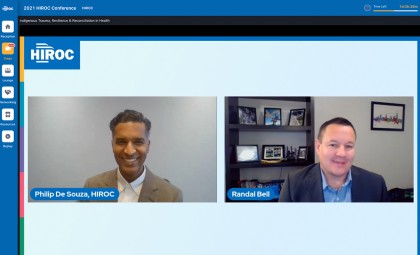“You drown not by falling in a river, but by staying submerged in it.”

At the 2021 HIROC Conference, Randal Bell (AHS) urges us to recognize and break down barriers to Indigenous health
We encourage you to watch and share this presentation widely with your colleagues and peers (see the video below). Bell's message is one that we all need to hear.
“Indigenous truth and reconciliation is not a cry for sympathy or pity, Indigenous truth and reconciliation is a plea for understanding.”
At the HIROC Conference on October 19, Randal Bell, Senior Advisor – Indigenous Populations, Provincial Planning & Capacity Management with Alberta Health Services (AHS) took the virtual stage to talk about the important role we all have in Indigenous reconciliation.
Bell called on studies, reports, and personal stories to paint a picture of generational trauma and a health system that has not been there to support Indigenous Canadians. “In most cases, trauma started the fire in Indigenous health, but it’s social determinants of health that keep that fire burning,” said Bell.
25 years after the Royal Commission on Aboriginal Peoples raised the alarm, our communities and our neighbours are still struggling.
In 2015 the median income of Indigenous people aged 15 and over was just $16,907, almost half the median income of non-Indigenous populations. In 2016, 36 per cent of Indigenous people lived in overcrowded homes, compared to only 8.5 per cent of non-Indigenous. Heart disease rates for Indigenous people are as much as 50 per cent higher than non-Indigenous, with a death rate from stroke almost twice as high.
Some people are reluctant to call Indigenous health a national crisis or a violation of basic human rights, but Bell cannot regard it as anything but.
How do we move forward in healthcare?
“Well, the first thing we need to do as health services is acknowledge and remove the biggest and oldest systemic barrier to healthcare there is.” Bell is referring to systemic racism and discrimination – unconscious bias in assessment, diagnosis, and treatment… barriers to accessing trauma-informed care, the list goes on.
In his presentation Bell calls upon the Truth and Reconciliation Commission of Canada’s health Calls to Action. Things like recognizing Indigenous healing practices, recognizing the distinct health needs of Indigenous people on and off reserves, sustainable funding for healing centres, increasing Indigenous health professionals, medical and nursing school curriculum. “We are never going to improve Indigenous health outcomes until all health professionals are familiar with the traumatic history of Indigenous people and the unique needs they present as a result.”
At the AHS, President and CEO Dr. Verna Yiu and her team do not shy away from the truth. They are working to establish partnerships with Indigenous healthcare groups, and creating avenues to facilitation truth and reconciliation within the organization and in their communities.
But what can we do as individuals? Bell says we can all stand up and speak out about racism. We can look for opportunities to decolonize racism in healthcare, and find ways to help build Indigenous trust in healthcare so people can get the care they need.
We encourage all our Subscribers to watch and share Randal Bell’s presentation from the 2021 HIROC Conference, even if you were unable to attend. And as you’re watching, we hope you’ll hear Bell’s message in your head, “Please understand that you have an important role to play in Indigenous reconciliation.”
